Comprehensive Report: Established Management Accounting Knowledge
VerifiedAdded on 2020/03/23
|12
|2251
|485
Report
AI Summary
This report delves into the realm of management accounting, exploring established knowledge, current research themes, and future directions. It begins by defining established knowledge in the context of management accounting, highlighting key areas such as cost control, budgeting, and the use of balanced scorecards. The report then examines current themes in management accounting research, including the influence of management accounting on managerial decisions, inter-organizational contexts, behavioral economics, balanced scorecards, and the role of creativity and risk. Furthermore, it discusses the need for replication in research to ensure reliability and validity, and the importance of focusing on the management aspects rather than solely on the accounting aspects. The report concludes by emphasizing the vast opportunities for further research in management accounting, particularly in aligning studies with real-world scenarios to produce practical results for both society and corporations. The report is a valuable resource for students seeking to understand the evolution and future of management accounting research.
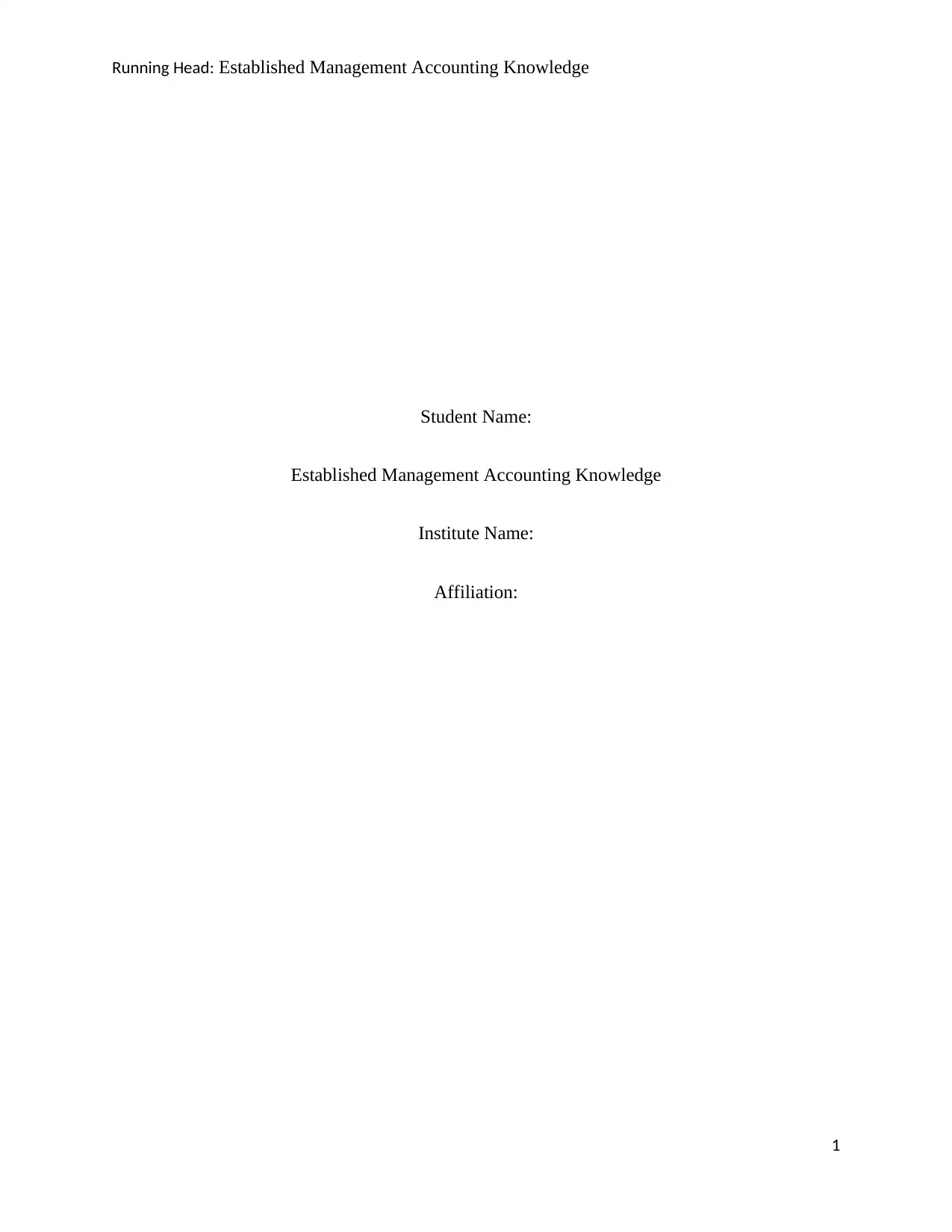
Running Head: Established Management Accounting Knowledge
Student Name:
Established Management Accounting Knowledge
Institute Name:
Affiliation:
1
Student Name:
Established Management Accounting Knowledge
Institute Name:
Affiliation:
1
Paraphrase This Document
Need a fresh take? Get an instant paraphrase of this document with our AI Paraphraser
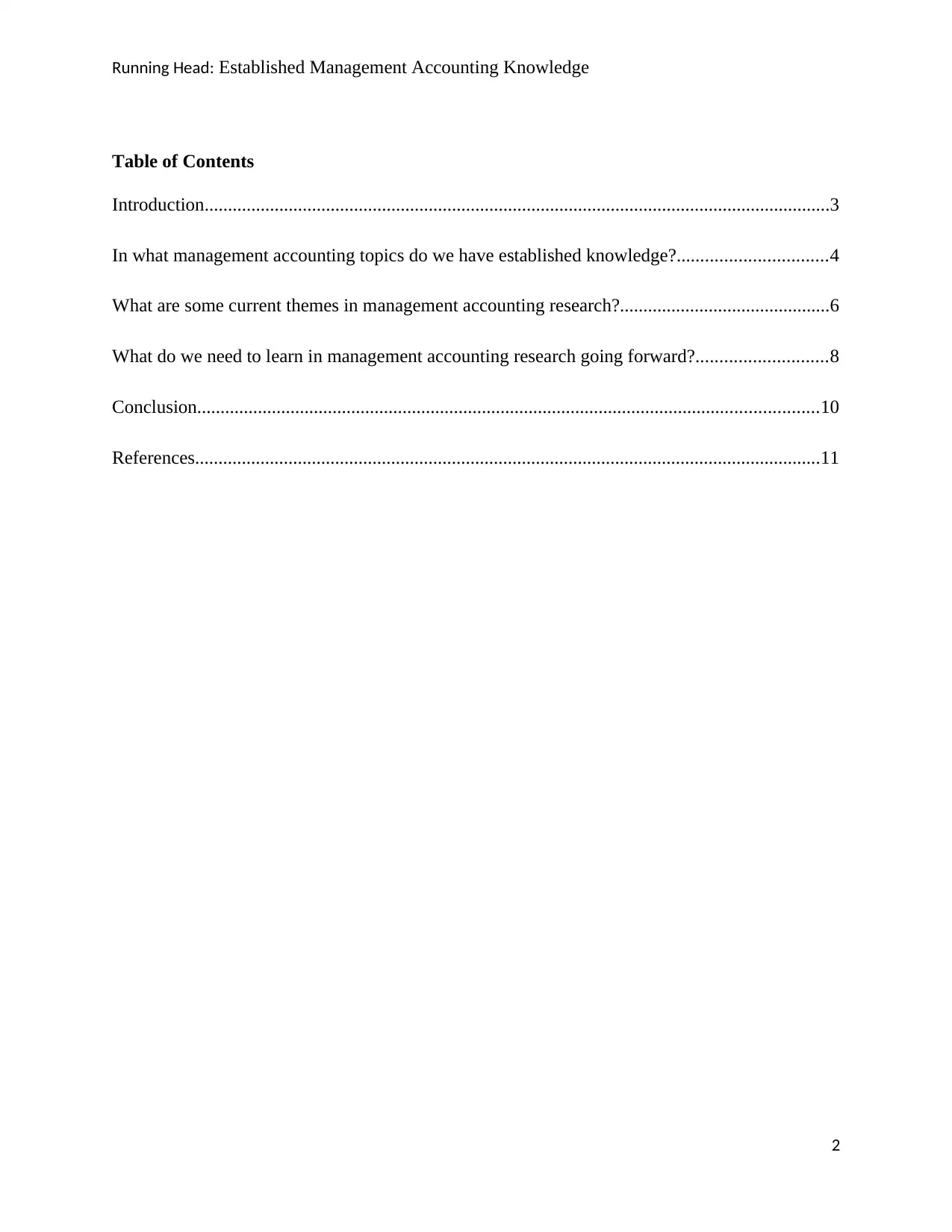
Running Head: Established Management Accounting Knowledge
Table of Contents
Introduction......................................................................................................................................3
In what management accounting topics do we have established knowledge?................................4
What are some current themes in management accounting research?.............................................6
What do we need to learn in management accounting research going forward?............................8
Conclusion.....................................................................................................................................10
References......................................................................................................................................11
2
Table of Contents
Introduction......................................................................................................................................3
In what management accounting topics do we have established knowledge?................................4
What are some current themes in management accounting research?.............................................6
What do we need to learn in management accounting research going forward?............................8
Conclusion.....................................................................................................................................10
References......................................................................................................................................11
2
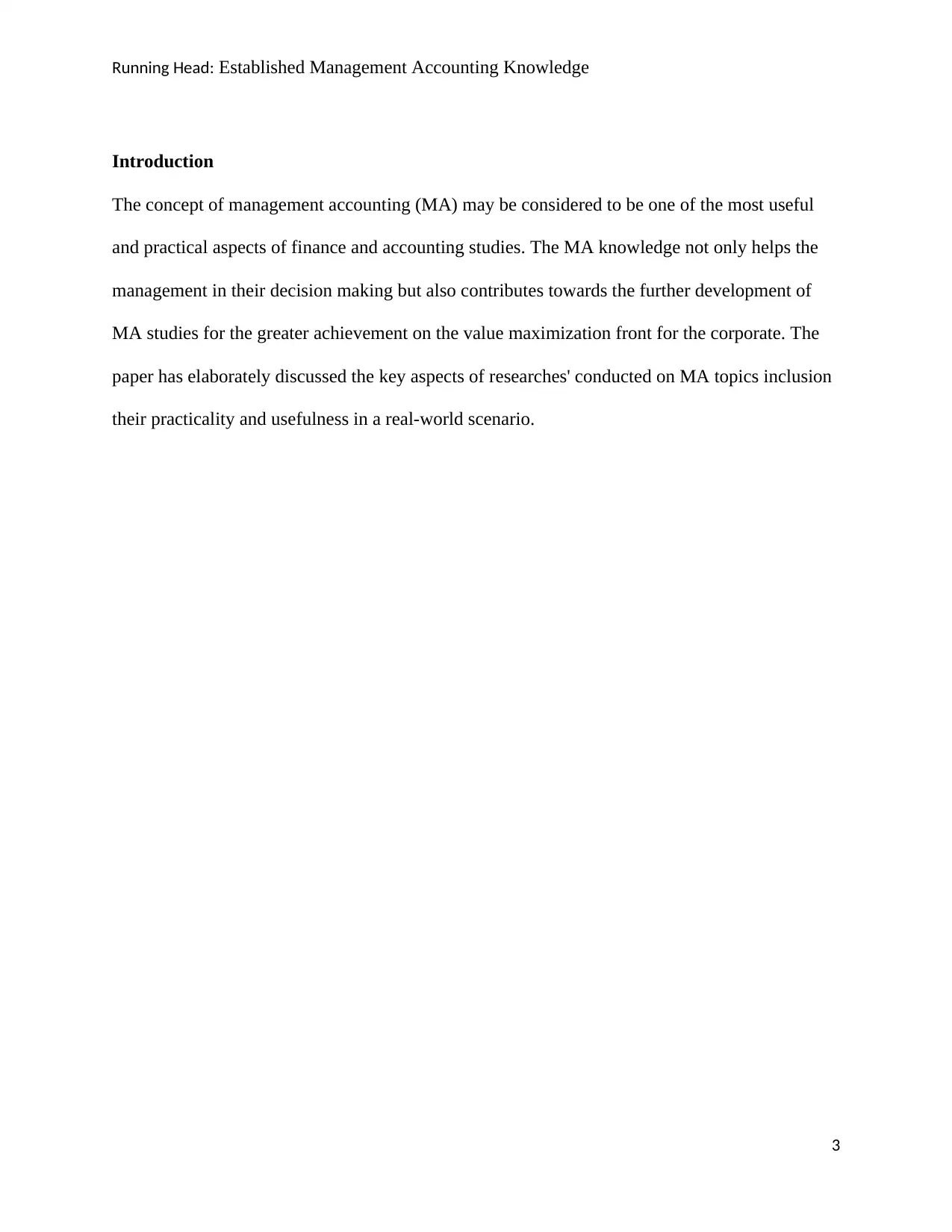
Running Head: Established Management Accounting Knowledge
Introduction
The concept of management accounting (MA) may be considered to be one of the most useful
and practical aspects of finance and accounting studies. The MA knowledge not only helps the
management in their decision making but also contributes towards the further development of
MA studies for the greater achievement on the value maximization front for the corporate. The
paper has elaborately discussed the key aspects of researches' conducted on MA topics inclusion
their practicality and usefulness in a real-world scenario.
3
Introduction
The concept of management accounting (MA) may be considered to be one of the most useful
and practical aspects of finance and accounting studies. The MA knowledge not only helps the
management in their decision making but also contributes towards the further development of
MA studies for the greater achievement on the value maximization front for the corporate. The
paper has elaborately discussed the key aspects of researches' conducted on MA topics inclusion
their practicality and usefulness in a real-world scenario.
3
⊘ This is a preview!⊘
Do you want full access?
Subscribe today to unlock all pages.

Trusted by 1+ million students worldwide
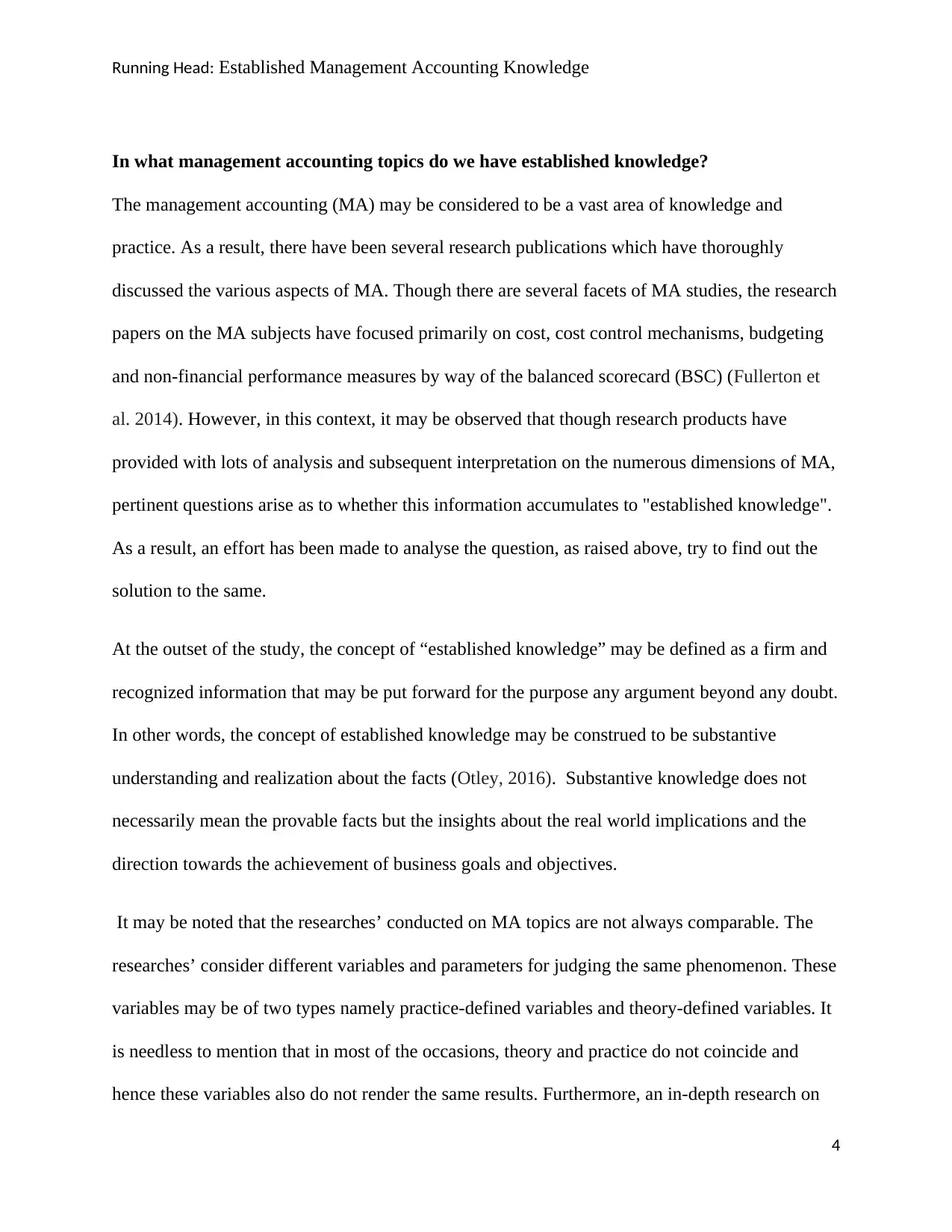
Running Head: Established Management Accounting Knowledge
In what management accounting topics do we have established knowledge?
The management accounting (MA) may be considered to be a vast area of knowledge and
practice. As a result, there have been several research publications which have thoroughly
discussed the various aspects of MA. Though there are several facets of MA studies, the research
papers on the MA subjects have focused primarily on cost, cost control mechanisms, budgeting
and non-financial performance measures by way of the balanced scorecard (BSC) (Fullerton et
al. 2014). However, in this context, it may be observed that though research products have
provided with lots of analysis and subsequent interpretation on the numerous dimensions of MA,
pertinent questions arise as to whether this information accumulates to "established knowledge".
As a result, an effort has been made to analyse the question, as raised above, try to find out the
solution to the same.
At the outset of the study, the concept of “established knowledge” may be defined as a firm and
recognized information that may be put forward for the purpose any argument beyond any doubt.
In other words, the concept of established knowledge may be construed to be substantive
understanding and realization about the facts (Otley, 2016). Substantive knowledge does not
necessarily mean the provable facts but the insights about the real world implications and the
direction towards the achievement of business goals and objectives.
It may be noted that the researches’ conducted on MA topics are not always comparable. The
researches’ consider different variables and parameters for judging the same phenomenon. These
variables may be of two types namely practice-defined variables and theory-defined variables. It
is needless to mention that in most of the occasions, theory and practice do not coincide and
hence these variables also do not render the same results. Furthermore, an in-depth research on
4
In what management accounting topics do we have established knowledge?
The management accounting (MA) may be considered to be a vast area of knowledge and
practice. As a result, there have been several research publications which have thoroughly
discussed the various aspects of MA. Though there are several facets of MA studies, the research
papers on the MA subjects have focused primarily on cost, cost control mechanisms, budgeting
and non-financial performance measures by way of the balanced scorecard (BSC) (Fullerton et
al. 2014). However, in this context, it may be observed that though research products have
provided with lots of analysis and subsequent interpretation on the numerous dimensions of MA,
pertinent questions arise as to whether this information accumulates to "established knowledge".
As a result, an effort has been made to analyse the question, as raised above, try to find out the
solution to the same.
At the outset of the study, the concept of “established knowledge” may be defined as a firm and
recognized information that may be put forward for the purpose any argument beyond any doubt.
In other words, the concept of established knowledge may be construed to be substantive
understanding and realization about the facts (Otley, 2016). Substantive knowledge does not
necessarily mean the provable facts but the insights about the real world implications and the
direction towards the achievement of business goals and objectives.
It may be noted that the researches’ conducted on MA topics are not always comparable. The
researches’ consider different variables and parameters for judging the same phenomenon. These
variables may be of two types namely practice-defined variables and theory-defined variables. It
is needless to mention that in most of the occasions, theory and practice do not coincide and
hence these variables also do not render the same results. Furthermore, an in-depth research on
4
Paraphrase This Document
Need a fresh take? Get an instant paraphrase of this document with our AI Paraphraser
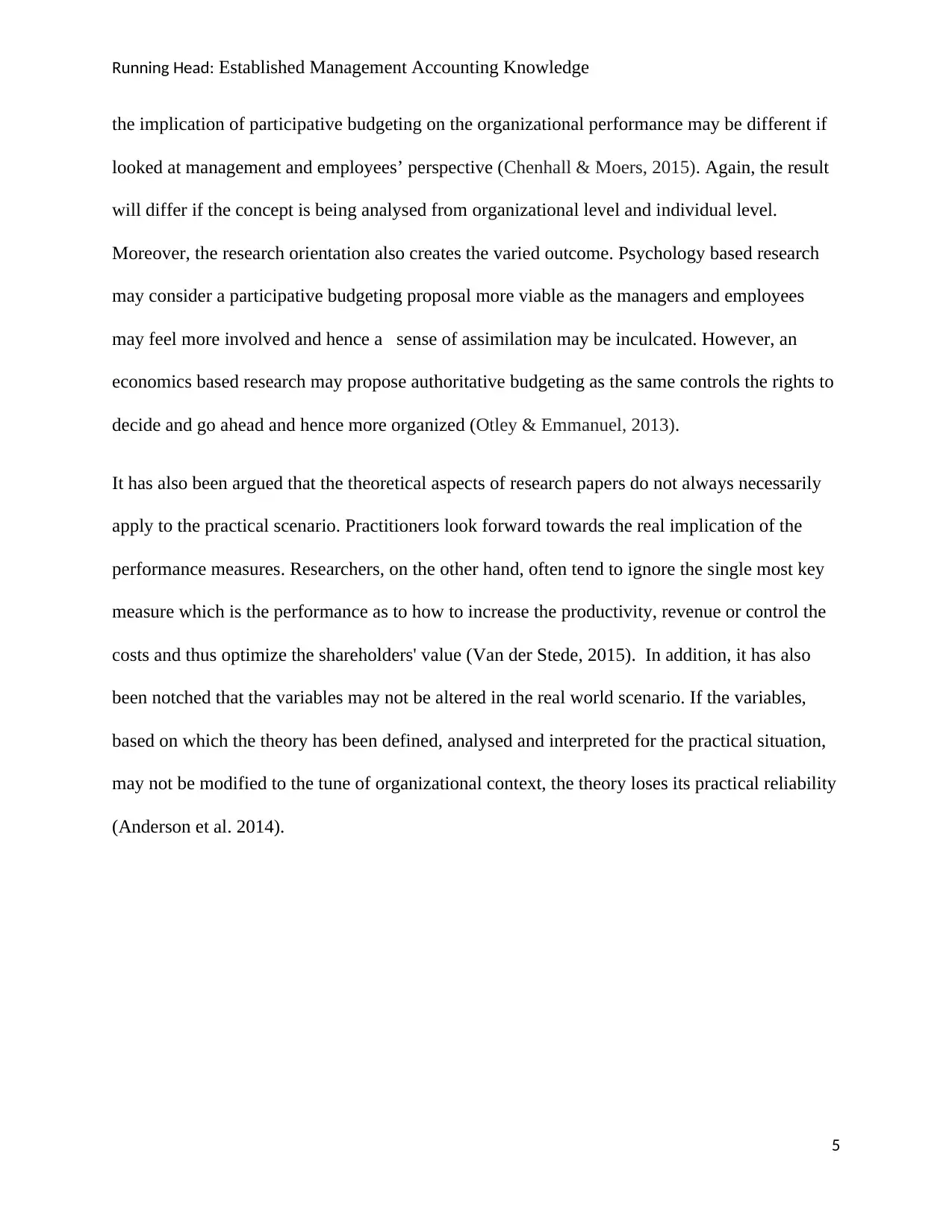
Running Head: Established Management Accounting Knowledge
the implication of participative budgeting on the organizational performance may be different if
looked at management and employees’ perspective (Chenhall & Moers, 2015). Again, the result
will differ if the concept is being analysed from organizational level and individual level.
Moreover, the research orientation also creates the varied outcome. Psychology based research
may consider a participative budgeting proposal more viable as the managers and employees
may feel more involved and hence a sense of assimilation may be inculcated. However, an
economics based research may propose authoritative budgeting as the same controls the rights to
decide and go ahead and hence more organized (Otley & Emmanuel, 2013).
It has also been argued that the theoretical aspects of research papers do not always necessarily
apply to the practical scenario. Practitioners look forward towards the real implication of the
performance measures. Researchers, on the other hand, often tend to ignore the single most key
measure which is the performance as to how to increase the productivity, revenue or control the
costs and thus optimize the shareholders' value (Van der Stede, 2015). In addition, it has also
been notched that the variables may not be altered in the real world scenario. If the variables,
based on which the theory has been defined, analysed and interpreted for the practical situation,
may not be modified to the tune of organizational context, the theory loses its practical reliability
(Anderson et al. 2014).
5
the implication of participative budgeting on the organizational performance may be different if
looked at management and employees’ perspective (Chenhall & Moers, 2015). Again, the result
will differ if the concept is being analysed from organizational level and individual level.
Moreover, the research orientation also creates the varied outcome. Psychology based research
may consider a participative budgeting proposal more viable as the managers and employees
may feel more involved and hence a sense of assimilation may be inculcated. However, an
economics based research may propose authoritative budgeting as the same controls the rights to
decide and go ahead and hence more organized (Otley & Emmanuel, 2013).
It has also been argued that the theoretical aspects of research papers do not always necessarily
apply to the practical scenario. Practitioners look forward towards the real implication of the
performance measures. Researchers, on the other hand, often tend to ignore the single most key
measure which is the performance as to how to increase the productivity, revenue or control the
costs and thus optimize the shareholders' value (Van der Stede, 2015). In addition, it has also
been notched that the variables may not be altered in the real world scenario. If the variables,
based on which the theory has been defined, analysed and interpreted for the practical situation,
may not be modified to the tune of organizational context, the theory loses its practical reliability
(Anderson et al. 2014).
5
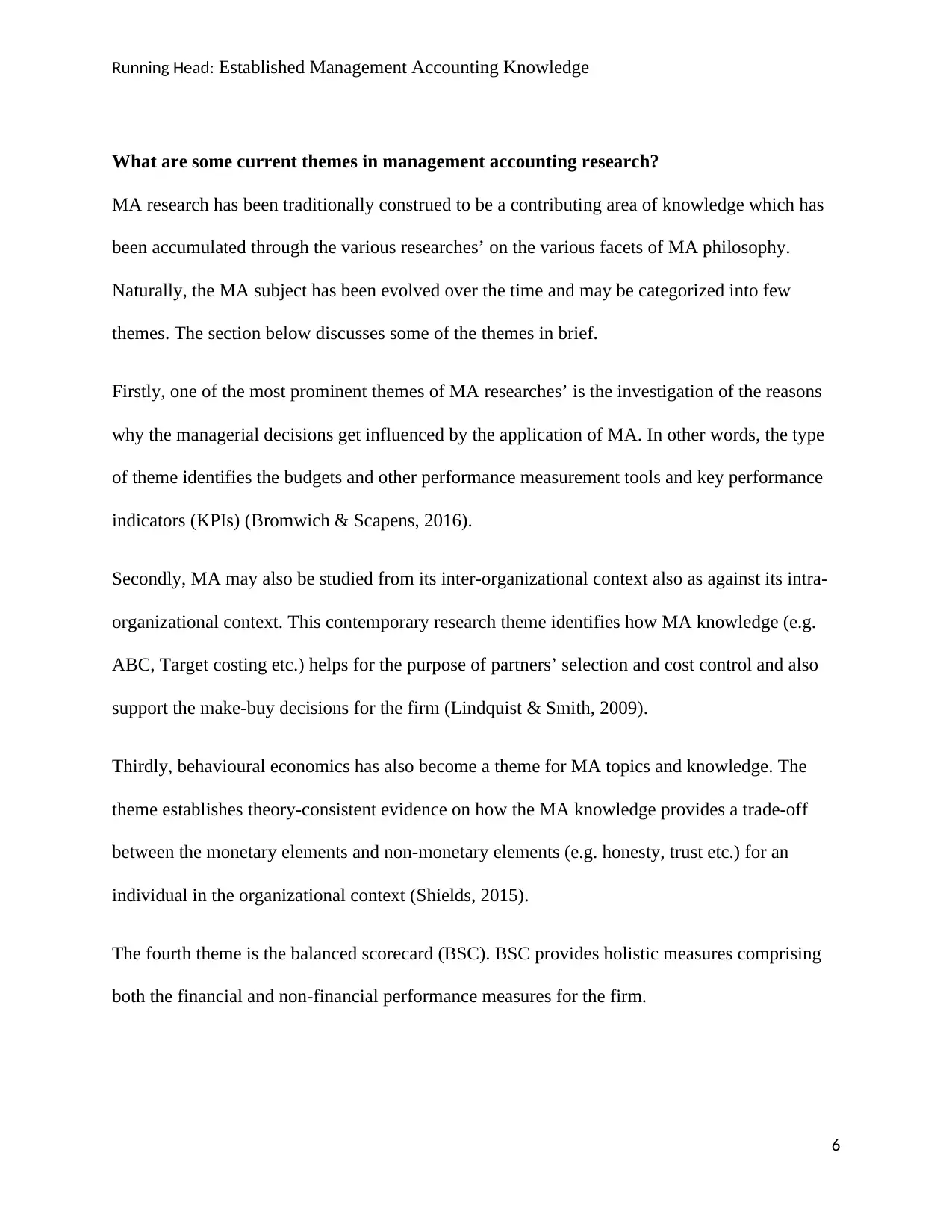
Running Head: Established Management Accounting Knowledge
What are some current themes in management accounting research?
MA research has been traditionally construed to be a contributing area of knowledge which has
been accumulated through the various researches’ on the various facets of MA philosophy.
Naturally, the MA subject has been evolved over the time and may be categorized into few
themes. The section below discusses some of the themes in brief.
Firstly, one of the most prominent themes of MA researches’ is the investigation of the reasons
why the managerial decisions get influenced by the application of MA. In other words, the type
of theme identifies the budgets and other performance measurement tools and key performance
indicators (KPIs) (Bromwich & Scapens, 2016).
Secondly, MA may also be studied from its inter-organizational context also as against its intra-
organizational context. This contemporary research theme identifies how MA knowledge (e.g.
ABC, Target costing etc.) helps for the purpose of partners’ selection and cost control and also
support the make-buy decisions for the firm (Lindquist & Smith, 2009).
Thirdly, behavioural economics has also become a theme for MA topics and knowledge. The
theme establishes theory-consistent evidence on how the MA knowledge provides a trade-off
between the monetary elements and non-monetary elements (e.g. honesty, trust etc.) for an
individual in the organizational context (Shields, 2015).
The fourth theme is the balanced scorecard (BSC). BSC provides holistic measures comprising
both the financial and non-financial performance measures for the firm.
6
What are some current themes in management accounting research?
MA research has been traditionally construed to be a contributing area of knowledge which has
been accumulated through the various researches’ on the various facets of MA philosophy.
Naturally, the MA subject has been evolved over the time and may be categorized into few
themes. The section below discusses some of the themes in brief.
Firstly, one of the most prominent themes of MA researches’ is the investigation of the reasons
why the managerial decisions get influenced by the application of MA. In other words, the type
of theme identifies the budgets and other performance measurement tools and key performance
indicators (KPIs) (Bromwich & Scapens, 2016).
Secondly, MA may also be studied from its inter-organizational context also as against its intra-
organizational context. This contemporary research theme identifies how MA knowledge (e.g.
ABC, Target costing etc.) helps for the purpose of partners’ selection and cost control and also
support the make-buy decisions for the firm (Lindquist & Smith, 2009).
Thirdly, behavioural economics has also become a theme for MA topics and knowledge. The
theme establishes theory-consistent evidence on how the MA knowledge provides a trade-off
between the monetary elements and non-monetary elements (e.g. honesty, trust etc.) for an
individual in the organizational context (Shields, 2015).
The fourth theme is the balanced scorecard (BSC). BSC provides holistic measures comprising
both the financial and non-financial performance measures for the firm.
6
⊘ This is a preview!⊘
Do you want full access?
Subscribe today to unlock all pages.

Trusted by 1+ million students worldwide
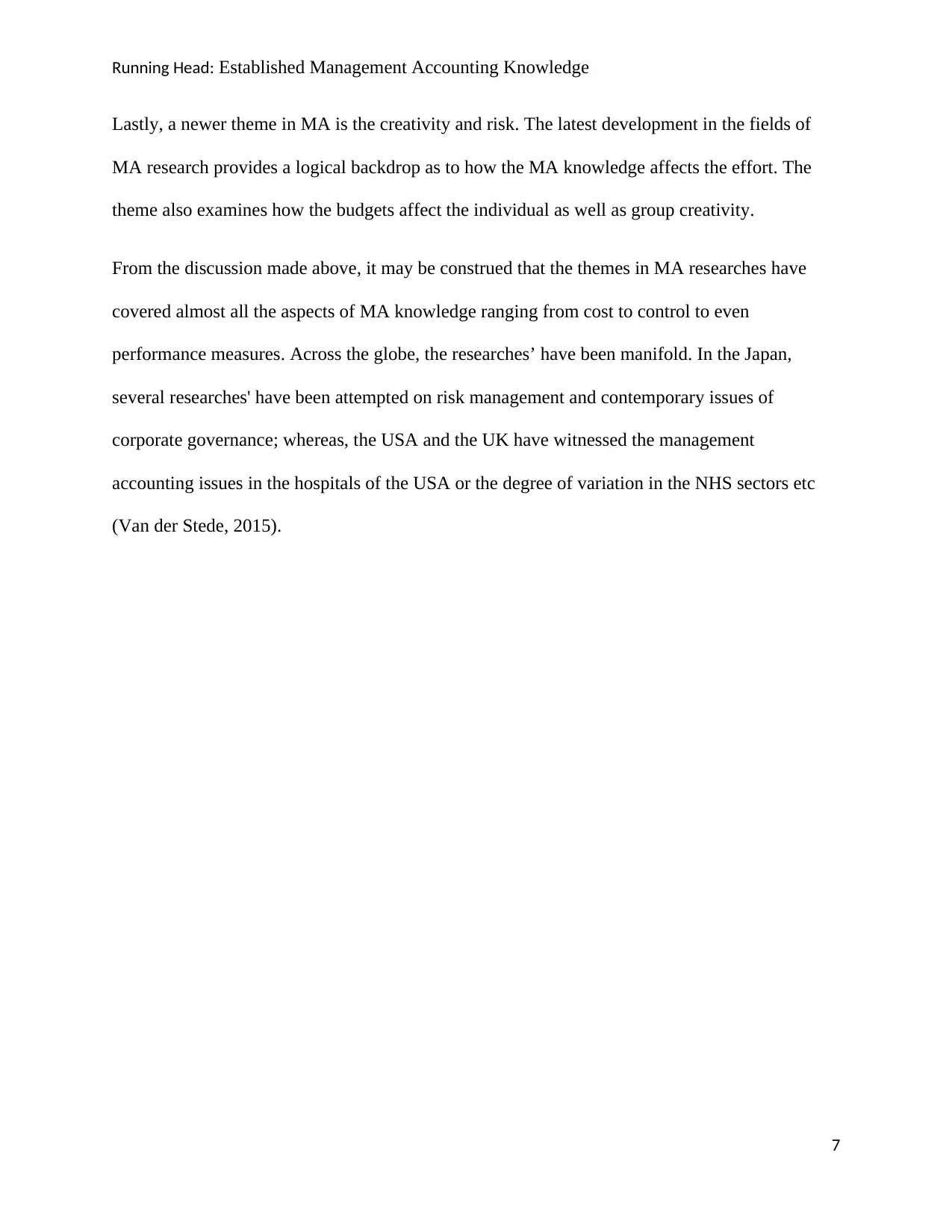
Running Head: Established Management Accounting Knowledge
Lastly, a newer theme in MA is the creativity and risk. The latest development in the fields of
MA research provides a logical backdrop as to how the MA knowledge affects the effort. The
theme also examines how the budgets affect the individual as well as group creativity.
From the discussion made above, it may be construed that the themes in MA researches have
covered almost all the aspects of MA knowledge ranging from cost to control to even
performance measures. Across the globe, the researches’ have been manifold. In the Japan,
several researches' have been attempted on risk management and contemporary issues of
corporate governance; whereas, the USA and the UK have witnessed the management
accounting issues in the hospitals of the USA or the degree of variation in the NHS sectors etc
(Van der Stede, 2015).
7
Lastly, a newer theme in MA is the creativity and risk. The latest development in the fields of
MA research provides a logical backdrop as to how the MA knowledge affects the effort. The
theme also examines how the budgets affect the individual as well as group creativity.
From the discussion made above, it may be construed that the themes in MA researches have
covered almost all the aspects of MA knowledge ranging from cost to control to even
performance measures. Across the globe, the researches’ have been manifold. In the Japan,
several researches' have been attempted on risk management and contemporary issues of
corporate governance; whereas, the USA and the UK have witnessed the management
accounting issues in the hospitals of the USA or the degree of variation in the NHS sectors etc
(Van der Stede, 2015).
7
Paraphrase This Document
Need a fresh take? Get an instant paraphrase of this document with our AI Paraphraser
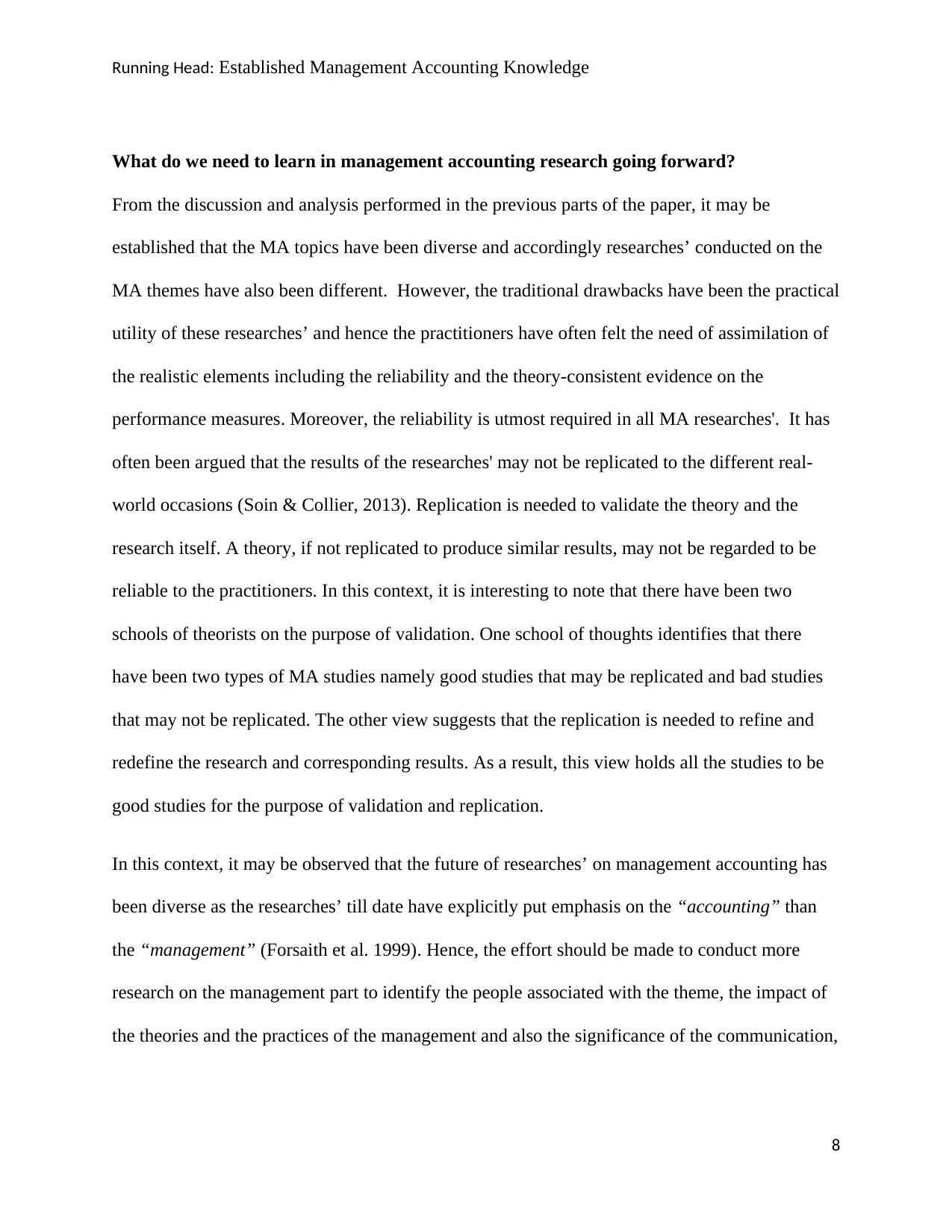
Running Head: Established Management Accounting Knowledge
What do we need to learn in management accounting research going forward?
From the discussion and analysis performed in the previous parts of the paper, it may be
established that the MA topics have been diverse and accordingly researches’ conducted on the
MA themes have also been different. However, the traditional drawbacks have been the practical
utility of these researches’ and hence the practitioners have often felt the need of assimilation of
the realistic elements including the reliability and the theory-consistent evidence on the
performance measures. Moreover, the reliability is utmost required in all MA researches'. It has
often been argued that the results of the researches' may not be replicated to the different real-
world occasions (Soin & Collier, 2013). Replication is needed to validate the theory and the
research itself. A theory, if not replicated to produce similar results, may not be regarded to be
reliable to the practitioners. In this context, it is interesting to note that there have been two
schools of theorists on the purpose of validation. One school of thoughts identifies that there
have been two types of MA studies namely good studies that may be replicated and bad studies
that may not be replicated. The other view suggests that the replication is needed to refine and
redefine the research and corresponding results. As a result, this view holds all the studies to be
good studies for the purpose of validation and replication.
In this context, it may be observed that the future of researches’ on management accounting has
been diverse as the researches’ till date have explicitly put emphasis on the “accounting” than
the “management” (Forsaith et al. 1999). Hence, the effort should be made to conduct more
research on the management part to identify the people associated with the theme, the impact of
the theories and the practices of the management and also the significance of the communication,
8
What do we need to learn in management accounting research going forward?
From the discussion and analysis performed in the previous parts of the paper, it may be
established that the MA topics have been diverse and accordingly researches’ conducted on the
MA themes have also been different. However, the traditional drawbacks have been the practical
utility of these researches’ and hence the practitioners have often felt the need of assimilation of
the realistic elements including the reliability and the theory-consistent evidence on the
performance measures. Moreover, the reliability is utmost required in all MA researches'. It has
often been argued that the results of the researches' may not be replicated to the different real-
world occasions (Soin & Collier, 2013). Replication is needed to validate the theory and the
research itself. A theory, if not replicated to produce similar results, may not be regarded to be
reliable to the practitioners. In this context, it is interesting to note that there have been two
schools of theorists on the purpose of validation. One school of thoughts identifies that there
have been two types of MA studies namely good studies that may be replicated and bad studies
that may not be replicated. The other view suggests that the replication is needed to refine and
redefine the research and corresponding results. As a result, this view holds all the studies to be
good studies for the purpose of validation and replication.
In this context, it may be observed that the future of researches’ on management accounting has
been diverse as the researches’ till date have explicitly put emphasis on the “accounting” than
the “management” (Forsaith et al. 1999). Hence, the effort should be made to conduct more
research on the management part to identify the people associated with the theme, the impact of
the theories and the practices of the management and also the significance of the communication,
8
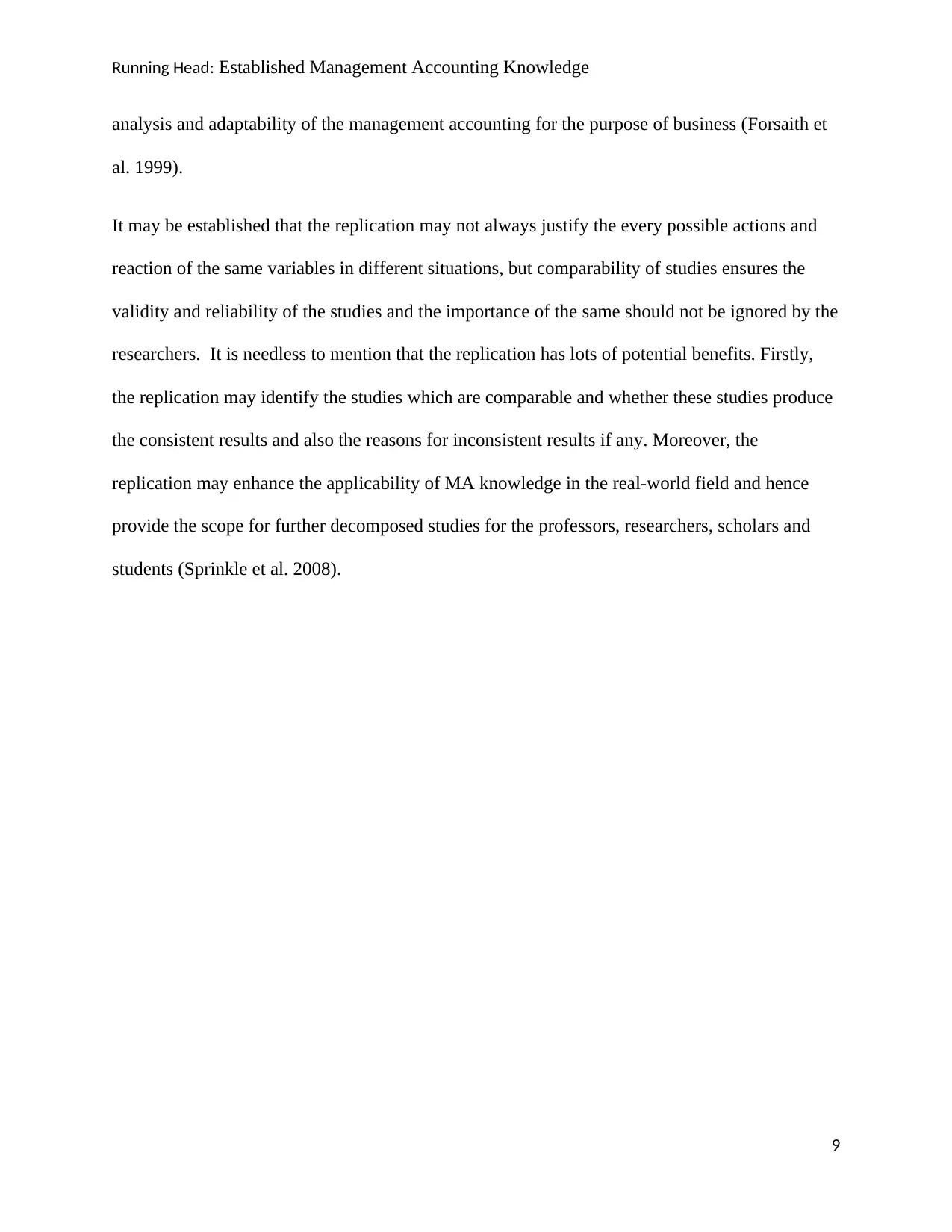
Running Head: Established Management Accounting Knowledge
analysis and adaptability of the management accounting for the purpose of business (Forsaith et
al. 1999).
It may be established that the replication may not always justify the every possible actions and
reaction of the same variables in different situations, but comparability of studies ensures the
validity and reliability of the studies and the importance of the same should not be ignored by the
researchers. It is needless to mention that the replication has lots of potential benefits. Firstly,
the replication may identify the studies which are comparable and whether these studies produce
the consistent results and also the reasons for inconsistent results if any. Moreover, the
replication may enhance the applicability of MA knowledge in the real-world field and hence
provide the scope for further decomposed studies for the professors, researchers, scholars and
students (Sprinkle et al. 2008).
9
analysis and adaptability of the management accounting for the purpose of business (Forsaith et
al. 1999).
It may be established that the replication may not always justify the every possible actions and
reaction of the same variables in different situations, but comparability of studies ensures the
validity and reliability of the studies and the importance of the same should not be ignored by the
researchers. It is needless to mention that the replication has lots of potential benefits. Firstly,
the replication may identify the studies which are comparable and whether these studies produce
the consistent results and also the reasons for inconsistent results if any. Moreover, the
replication may enhance the applicability of MA knowledge in the real-world field and hence
provide the scope for further decomposed studies for the professors, researchers, scholars and
students (Sprinkle et al. 2008).
9
⊘ This is a preview!⊘
Do you want full access?
Subscribe today to unlock all pages.

Trusted by 1+ million students worldwide
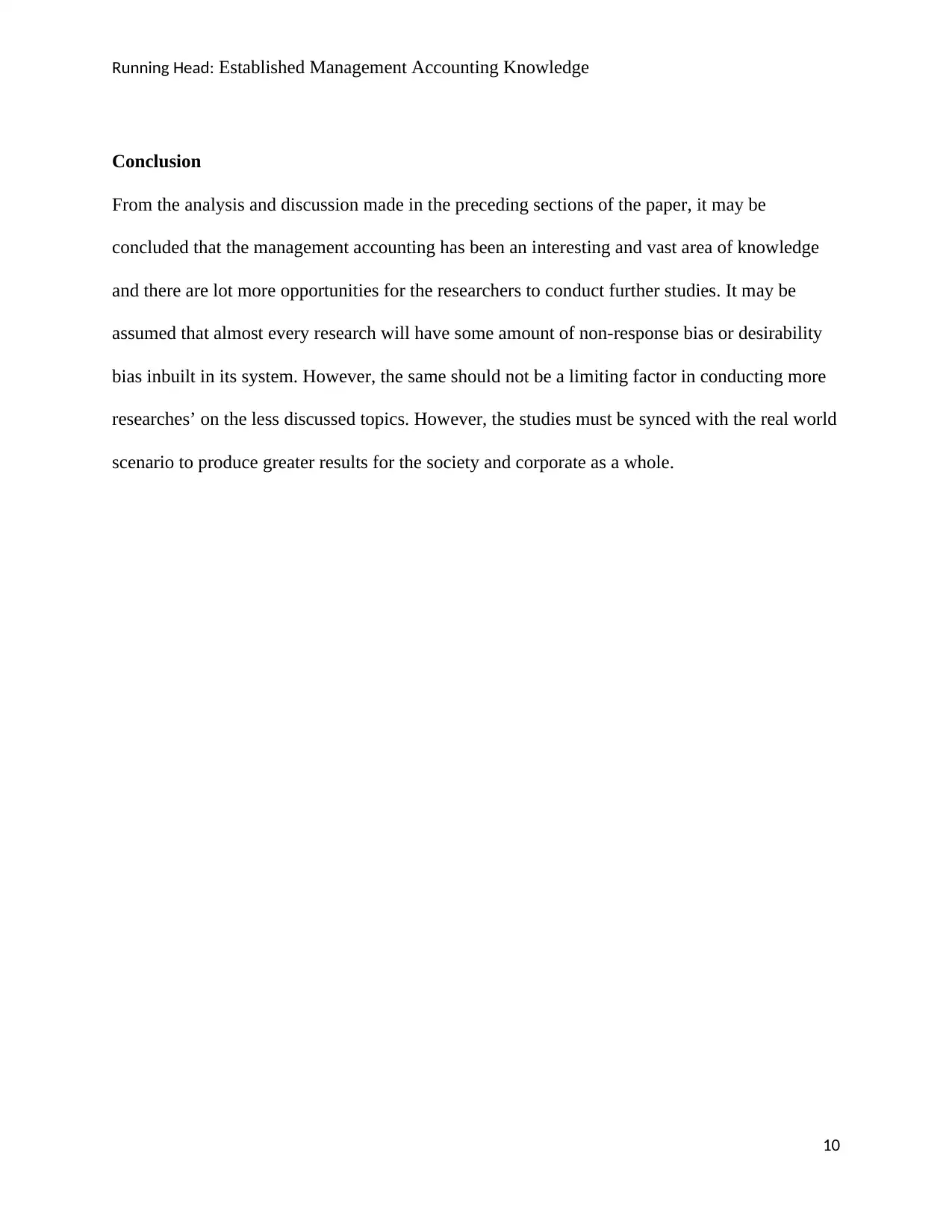
Running Head: Established Management Accounting Knowledge
Conclusion
From the analysis and discussion made in the preceding sections of the paper, it may be
concluded that the management accounting has been an interesting and vast area of knowledge
and there are lot more opportunities for the researchers to conduct further studies. It may be
assumed that almost every research will have some amount of non-response bias or desirability
bias inbuilt in its system. However, the same should not be a limiting factor in conducting more
researches’ on the less discussed topics. However, the studies must be synced with the real world
scenario to produce greater results for the society and corporate as a whole.
10
Conclusion
From the analysis and discussion made in the preceding sections of the paper, it may be
concluded that the management accounting has been an interesting and vast area of knowledge
and there are lot more opportunities for the researchers to conduct further studies. It may be
assumed that almost every research will have some amount of non-response bias or desirability
bias inbuilt in its system. However, the same should not be a limiting factor in conducting more
researches’ on the less discussed topics. However, the studies must be synced with the real world
scenario to produce greater results for the society and corporate as a whole.
10
Paraphrase This Document
Need a fresh take? Get an instant paraphrase of this document with our AI Paraphraser
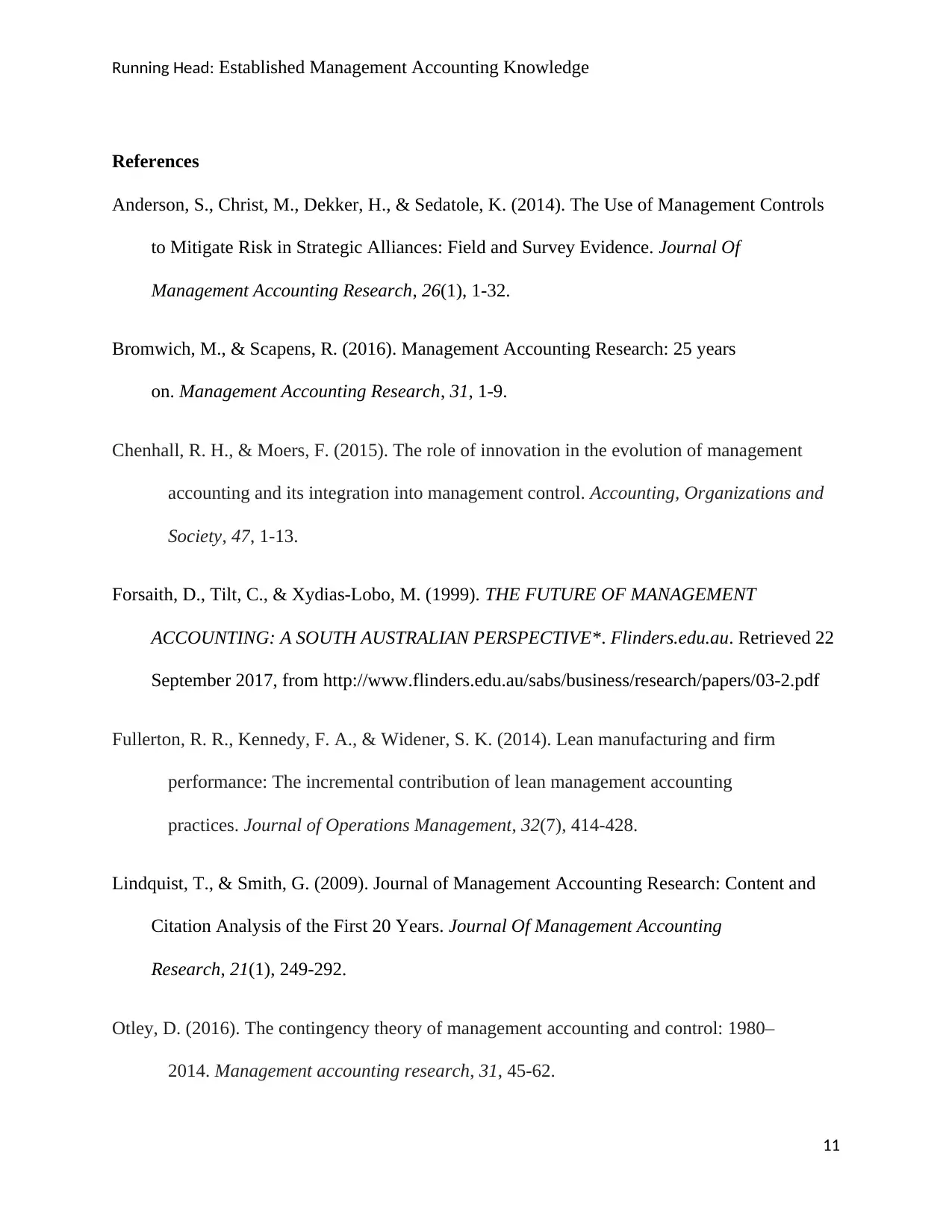
Running Head: Established Management Accounting Knowledge
References
Anderson, S., Christ, M., Dekker, H., & Sedatole, K. (2014). The Use of Management Controls
to Mitigate Risk in Strategic Alliances: Field and Survey Evidence. Journal Of
Management Accounting Research, 26(1), 1-32.
Bromwich, M., & Scapens, R. (2016). Management Accounting Research: 25 years
on. Management Accounting Research, 31, 1-9.
Chenhall, R. H., & Moers, F. (2015). The role of innovation in the evolution of management
accounting and its integration into management control. Accounting, Organizations and
Society, 47, 1-13.
Forsaith, D., Tilt, C., & Xydias-Lobo, M. (1999). THE FUTURE OF MANAGEMENT
ACCOUNTING: A SOUTH AUSTRALIAN PERSPECTIVE*. Flinders.edu.au. Retrieved 22
September 2017, from http://www.flinders.edu.au/sabs/business/research/papers/03-2.pdf
Fullerton, R. R., Kennedy, F. A., & Widener, S. K. (2014). Lean manufacturing and firm
performance: The incremental contribution of lean management accounting
practices. Journal of Operations Management, 32(7), 414-428.
Lindquist, T., & Smith, G. (2009). Journal of Management Accounting Research: Content and
Citation Analysis of the First 20 Years. Journal Of Management Accounting
Research, 21(1), 249-292.
Otley, D. (2016). The contingency theory of management accounting and control: 1980–
2014. Management accounting research, 31, 45-62.
11
References
Anderson, S., Christ, M., Dekker, H., & Sedatole, K. (2014). The Use of Management Controls
to Mitigate Risk in Strategic Alliances: Field and Survey Evidence. Journal Of
Management Accounting Research, 26(1), 1-32.
Bromwich, M., & Scapens, R. (2016). Management Accounting Research: 25 years
on. Management Accounting Research, 31, 1-9.
Chenhall, R. H., & Moers, F. (2015). The role of innovation in the evolution of management
accounting and its integration into management control. Accounting, Organizations and
Society, 47, 1-13.
Forsaith, D., Tilt, C., & Xydias-Lobo, M. (1999). THE FUTURE OF MANAGEMENT
ACCOUNTING: A SOUTH AUSTRALIAN PERSPECTIVE*. Flinders.edu.au. Retrieved 22
September 2017, from http://www.flinders.edu.au/sabs/business/research/papers/03-2.pdf
Fullerton, R. R., Kennedy, F. A., & Widener, S. K. (2014). Lean manufacturing and firm
performance: The incremental contribution of lean management accounting
practices. Journal of Operations Management, 32(7), 414-428.
Lindquist, T., & Smith, G. (2009). Journal of Management Accounting Research: Content and
Citation Analysis of the First 20 Years. Journal Of Management Accounting
Research, 21(1), 249-292.
Otley, D. (2016). The contingency theory of management accounting and control: 1980–
2014. Management accounting research, 31, 45-62.
11
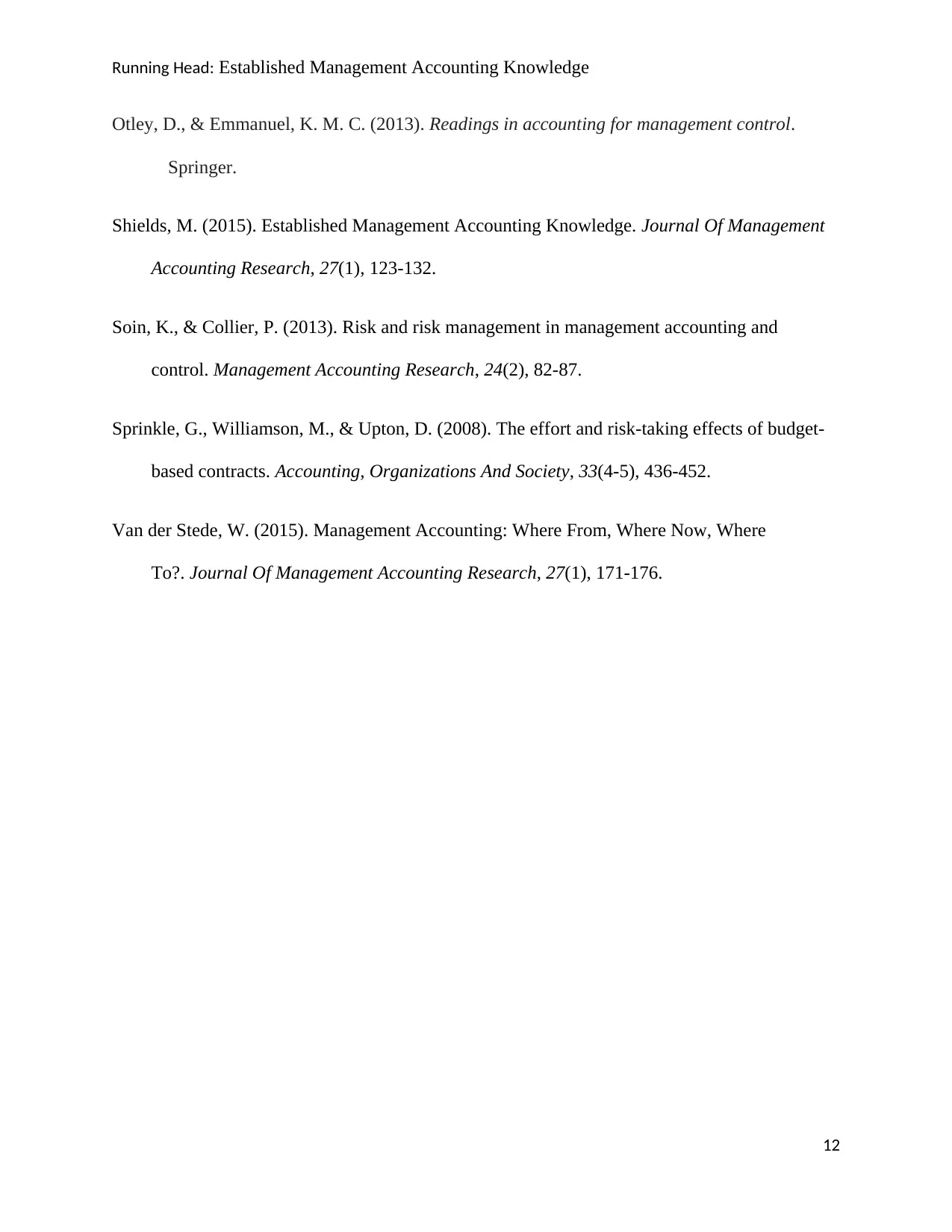
Running Head: Established Management Accounting Knowledge
Otley, D., & Emmanuel, K. M. C. (2013). Readings in accounting for management control.
Springer.
Shields, M. (2015). Established Management Accounting Knowledge. Journal Of Management
Accounting Research, 27(1), 123-132.
Soin, K., & Collier, P. (2013). Risk and risk management in management accounting and
control. Management Accounting Research, 24(2), 82-87.
Sprinkle, G., Williamson, M., & Upton, D. (2008). The effort and risk-taking effects of budget-
based contracts. Accounting, Organizations And Society, 33(4-5), 436-452.
Van der Stede, W. (2015). Management Accounting: Where From, Where Now, Where
To?. Journal Of Management Accounting Research, 27(1), 171-176.
12
Otley, D., & Emmanuel, K. M. C. (2013). Readings in accounting for management control.
Springer.
Shields, M. (2015). Established Management Accounting Knowledge. Journal Of Management
Accounting Research, 27(1), 123-132.
Soin, K., & Collier, P. (2013). Risk and risk management in management accounting and
control. Management Accounting Research, 24(2), 82-87.
Sprinkle, G., Williamson, M., & Upton, D. (2008). The effort and risk-taking effects of budget-
based contracts. Accounting, Organizations And Society, 33(4-5), 436-452.
Van der Stede, W. (2015). Management Accounting: Where From, Where Now, Where
To?. Journal Of Management Accounting Research, 27(1), 171-176.
12
⊘ This is a preview!⊘
Do you want full access?
Subscribe today to unlock all pages.

Trusted by 1+ million students worldwide
1 out of 12
Related Documents
Your All-in-One AI-Powered Toolkit for Academic Success.
+13062052269
info@desklib.com
Available 24*7 on WhatsApp / Email
![[object Object]](/_next/static/media/star-bottom.7253800d.svg)
Unlock your academic potential
Copyright © 2020–2025 A2Z Services. All Rights Reserved. Developed and managed by ZUCOL.





